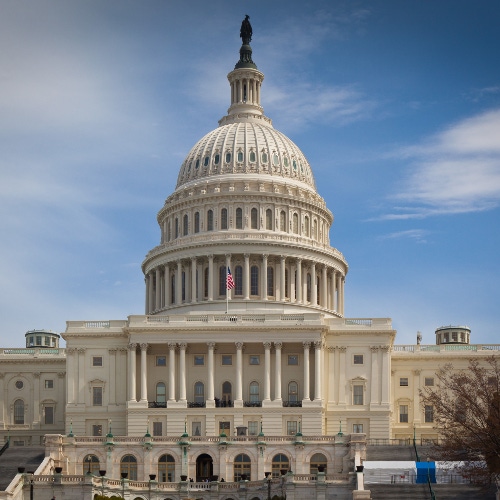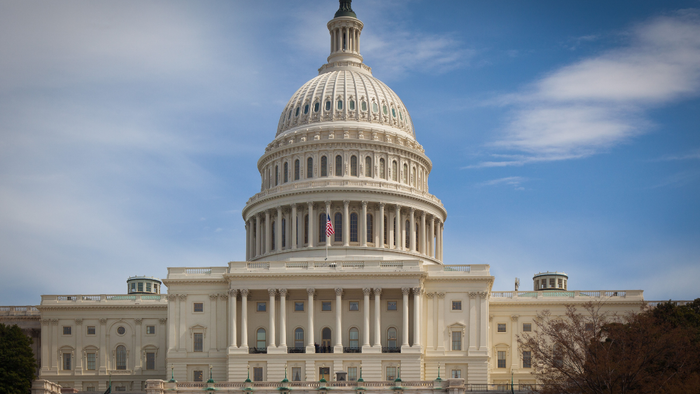Here are some of the broadband policy matters facing the outgoing and incoming US Congress that will help determine the implementation of BEAD and more.

As the year starts drawing to a close, so does the tenure of the 117th Congress. That body, under President Biden, passed $65 billion in broadband funding in the Infrastructure Investments and Jobs Act (IIJA), plus billions more for broadband in the American Rescue Plan and Consolidated Appropriations Act of 2021.
With that funding in place, there are still several broadband policy issues and related matters for Congress to sort out. Meanwhile, the current Congress has few working days left in 2022 – and still needs to pass a budget for 2023 – and it's unclear how much legislation will reach President Biden's desk when Republicans gain the House majority in January.
Figure 1:  (Source: Inge Johnsson/Alamy Stock Photo)
(Source: Inge Johnsson/Alamy Stock Photo)
Here are some policy matters to watch for the remaining and coming term:
Senate confirmation for Sohn
With the midterm elections out of the way, and the Senate to remain in Democratic control, Gigi Sohn, President Biden's pick for fifth FCC Commissioner – nominated back in October 2021 – is likely to get confirmed. Some in the industry think it could happen under the current Congress, before the end of the year.
"A major priority for a whole range of industries and consumer groups is getting Gigi Sohn confirmed," said Ernesto Falcon, senior legislative counsel with the Electronic Frontier Foundation (EFF). "That sets the stage for the FCC to then begin kind of implementing a number of policy goals."
Various advocacy groups have pressured the Senate over the past year to confirm Sohn. In a recent letter, labor groups including the Communications Workers of America (CWA), International Brotherhood of Electrical Workers and others urged senators "to swiftly advance the nomination of Gigi Sohn" noting that the "FCC needs a fully seated commission in order to make critical decisions during a period of increased federal investment in broadband networks and digital equity initiatives."
Tax bill
One issue hanging over the federal government's broadband billions is that a change made to tax law in 2017 now treats those grants as taxable income. In a recent letter to senators, several groups representing the service provider industry said the current law could put ISPs on the hook to return up to 21% of their infrastructure grants. Those groups, including USTelecom, CTIA and others, are urging the passage of the Broadband Grant Tax Treatment, which would exempt recipients of broadband funding through the American Rescue Plan Act (ARPA) and the Infrastructure Investments and Jobs Act (IIJA) from taxation.
In an email to Light Reading, a spokesperson for USTelecom expressed hope the bill could pass as part of an end-of-year government spending package.
"Congress is working hard to assemble an end of the year spending package. We know this and other tax provisions are being discussed. Our goal is to see this legislation pass, either before the end of the year or into the new year," said the spokesperson.
"Unless the law is changed soon, the goal of 100 percent connectivity is in jeopardy as fewer people will be reached."
Asked whether there's concern about it passing in a split Congress next year, the spokesperson added: "While there are challenges to divided government, we feel this is an issue that can bridge those gaps."
Permitting reform
Another issue that could come before Congress next year is permitting reform, which is a "major Republican priority," according to Gary Bolton, CEO of the Fiber Broadband Association (FBA). "Permitting reform, of course, is a significantly impactful issue for the successful implementation of BEAD and other federal broadband support programs," Bolton added.
Speaking on a recent webinar hosted by FBA about permitting roadblocks to implementing the $42.5 billion Broadband Equity, Access and Deployment program (BEAD), Kate O'Connor, chief counsel for the House subcommittee on communications and technology, said the BEAD funding "can all be wasted" without congressional action on permitting.
"I think that there's really significant issues that will arise if ... these permanent reforms aren't enacted quickly," she said. Some reforms Republicans are considering include streamlining barriers to building new infrastructure where it doesn't already exist, cutting back on environmental reviews and accelerating deployments on federal land.
ReConnect, revised
The cable industry is backing a bill introduced last week by a bipartisan group of senators that would update the USDA ReConnect program, which provides loans and grants for rural broadband deployment. The Rural Internet Improvement Act of 2022 was introduced by Senator John Thune (R-SD), with support from Sens. Ben Ray Luján (D-NM), Amy Klobuchar (D-MN) and Deb Fischer (R-NE).
The legislation would change the program by prioritizing applications "that have demonstrated the technical and financial experience required to construct and operate broadband networks," as well as by streamlining the application process. Further, it would reserve funding for areas where at least 90% of households lack broadband access.
The bill has support from NCTA-The Internet & Television Association, which issued a statement saying it would "enhance participation and results, so that more communities can be connected to broadband even faster.
"Most significantly, this bill would direct funding for network expansion to areas where at least 90% of households lack access to broadband, and it would encourage reliance on applicants with demonstrated experience constructing and operating broadband networks in order to promote network construction that is on budget and on time," said NCTA. The legislation is one to watch, as it is expected to be attached to next year's farm bill.
Oversight hearings
While it's unclear how much new legislation the new Congress will pass, incoming Republican House leaders have expressed an interest in holding hearings on various matters related to the Biden administration. We can expect some of those hearings to cover the implementation of the IIJA's broadband legislation, said Falcon. That likely includes griping over the FCC's national broadband map and BEAD funding allocations.
"If members feel like their state is not given a fair shot at representing themselves before the federal dollars are dispersed, the oversight process is how you communicate that to the FCC, and to the NTIA."
A recent letter from Republican senators to NTIA highlights another issue likely to come up in hearings next year: that of NTIA's omission of broadband projects using unlicensed spectrum from the BEAD program. In a letter, the senators urged NTIA to revise its "definition of reliable broadband service to include broadband provided exclusively over unlicensed spectrum."
To that end, the Fiber Broadband Association's Bolton told Light Reading that "FBA is focused on implementation of IIJA – holding the line on NTIA's policy choices, while working with them and the Administration on supply chain and Buy America issues."
"This is not a time to look back or re-hash debates; it's time to move forward and connect all Americans," he added.
In a newsletter on December 2, Jonathan Chambers, partner with broadband consultancy and ISP Conexon, noted that: "Some members of Congress have recently suggested unlicensed fixed wireless should be adequate for rural America," adding: "The damage to rural America of such a policy would be incalculable."
A 'nuclear' policy issue
One potential threat to the future of broadband rests with the fifth circuit court, courtesy of a lawsuit brought in January 2022 challenging the constitutionality of the Universal Service Fund (USF), which helps support telecommunication networks. The lawsuit was filed by nonprofit research firm Consumers' Research and communications service provider Cause Based Commerce, and alleges that the FCC's approval of USF exceeds its authority and violates the constitution.
Should a judge decide USF is unconstitutional, "that will be a nuclear bomb in telecom policy," said EFF's Falcon, and would require action from Congress to resolve, putting various broadband expansion and implementation issues in limbo. "So many things are dependent on that program," Falcon said.
Related posts:
— Nicole Ferraro, editor, Light Reading, and host of "The Divide" podcast.
About the Author(s)
You May Also Like











